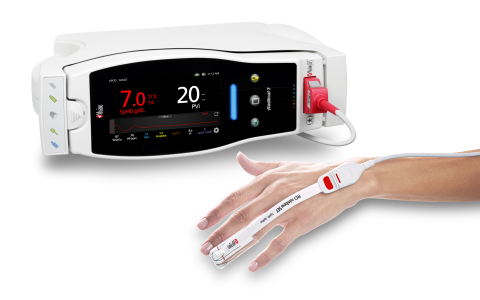Masimo (NASDAQ: MASI) announced today that in a study published in Injury, researchers used Masimo SpHb® – noninvasive, continuous hemoglobin monitoring – to investigate possible delays in the detection of perioperative anemia assessed using invasive, intermittent laboratory hemoglobin values in elderly patients undergoing hip fracture surgery.1 In addition, they investigated associations between a) this delay and cumulative perioperative time with anemia, monitored using SpHb, and b) patient outcomes (postoperative delirium and mortality or severe complications).
Dr. Christopher G. Clemmesen and colleagues at Copenhagen University Hospital in Denmark sought to investigate the impact of anemia during surgery on patient outcomes – and whether noninvasive hemoglobin monitoring using Masimo SpHb might provide an earlier indication of perioperative anemia, as well as more effectively track total time with perioperative anemia, than traditional, intermittent invasive blood sampling. Data from 41 patients, aged 65 or older, undergoing surgery to repair hip fractures, were analyzed. Blood samples were taken as per standard hospital protocol, with transfusions triggered by a hemoglobin (Hb) value below 10 g/dL, which was also used to define anemia. Throughout surgery, SpHb, as well as oxygen saturation (SpO2), perfusion index (Pi), and pulse rate (PR), were noninvasively monitored using Masimo Radical-7® Pulse CO-Oximeters and rainbow® sensors. The clinicians were blinded to data other than SpO2 to prevent them from using SpHb or Pi values to guide transfusion or other clinical decisions.
The researchers found a mean delay in the detection of anemia (defined as the time lag between an SpHb value of 10 g/dL or less and a similarly low Hb value obtained through blood sampling) of 1.07 hours (± 2.84 hours). They found a significant association between median cumulative perioperative time with low SpHb (defined as SpHb below 10 g/dL for at least one minute) and postoperative delirium: 162 minutes for patients with delirium vs. 22 minutes for patients without (p = 0.034).
The researchers concluded, “In conclusion, we found a delay in transfusion threshold detection on average, and for some patients, the delay was substantial despite the study being done in an optimized perioperative setting in a specialized ward. Continuous monitoring with SpHb during the perioperative period revealed that some patients had Hb levels below the prescribed transfusion threshold for a prolonged period. Furthermore, we found a significant association between the presence of low SpHb and postoperative outcomes, and between the cumulated time with low SpHb and postoperative outcomes. ... Whether or not increased monitoring translates into improved patient outcomes will require further studies.”
Study co-author Dr. Nicolai B. Foss commented, “There can be a significant delay in perioperative detection of anemia in hip fracture patients, and the time spent anemic, as measured continuously by SpHb, was associated with poor outcomes in our study. We need continuous monitoring in order to identify and act on anemia in a timely manner to improve patient outcomes. We believe that future transfusion studies should include improved perioperative monitoring of hemoglobin to help identify anemia.”
SpHb is not intended to replace laboratory blood testing. Clinical decisions regarding red blood cell transfusions should be based on the clinician’s judgment considering among other factors: patient condition and laboratory diagnostic tests using blood samples.
About Masimo
Masimo (NASDAQ: MASI) is a global medical technology company that develops and produces a wide array of industry-leading monitoring technologies, including innovative measurements, sensors, patient monitors, and automation and connectivity solutions. Our mission is to improve patient outcomes and reduce the cost of care. Masimo SET® Measure-through Motion and Low Perfusion™ pulse oximetry, introduced in 1995, has been shown in over 100 independent and objective studies to outperform other pulse oximetry technologies.2 Masimo SET® has also been shown to help clinicians reduce severe retinopathy of prematurity in neonates,3 improve CCHD screening in newborns,4 and, when used for continuous monitoring with Masimo Patient SafetyNet™ in post-surgical wards, reduce rapid response team activations, ICU transfers, and costs.5-7 Masimo SET® is estimated to be used on more than 100 million patients in leading hospitals and other healthcare settings around the world,8 and is the primary pulse oximetry at 9 of the top 10 hospitals listed in the 2019-20 U.S. News and World Report Best Hospitals Honor Roll.9 Masimo continues to refine SET® and in 2018, announced that SpO2 accuracy on RD SET™ sensors during conditions of motion has been significantly improved, providing clinicians with even greater confidence that the SpO2 values they rely on accurately reflect a patient’s physiological status. In 2005, Masimo introduced rainbow® Pulse CO-Oximetry technology, allowing noninvasive and continuous monitoring of blood constituents that previously could only be measured invasively, including total hemoglobin (SpHb®), oxygen content (SpOC™), carboxyhemoglobin (SpCO®), methemoglobin (SpMet®), Pleth Variability Index (PVi®), RPVi™ (rainbow® PVi), and Oxygen Reserve Index (ORi™). In 2013, Masimo introduced the Root® Patient Monitoring and Connectivity Platform, built from the ground up to be as flexible and expandable as possible to facilitate the addition of other Masimo and third-party monitoring technologies; key Masimo additions include Next Generation SedLine® Brain Function Monitoring, O3® Regional Oximetry, and ISA™ Capnography with NomoLine® sampling lines. Masimo’s family of continuous and spot-check monitoring Pulse CO-Oximeters® includes devices designed for use in a variety of clinical and non-clinical scenarios, including tetherless, wearable technology, such as Radius-7® and Radius PPG™, portable devices like Rad-67™, fingertip pulse oximeters like MightySat® Rx, and devices available for use both in the hospital and at home, such as Rad-97™. Masimo hospital automation and connectivity solutions are centered around the Iris® platform, and include Iris Gateway™, Patient SafetyNet, Replica™, Halo ION™, UniView™, and Doctella™

 Masimo (NASDAQ: MASI) announced today that in a study published in Injury, researchers used Masimo SpHb® – noninvasive, continuous hemoglobin monitoring – to investigate possible delays in the detection of perioperative anemia
Masimo (NASDAQ: MASI) announced today that in a study published in Injury, researchers used Masimo SpHb® – noninvasive, continuous hemoglobin monitoring – to investigate possible delays in the detection of perioperative anemia









.jpeg)




.jpeg)

.jpg)













